Noraseri – Funeral
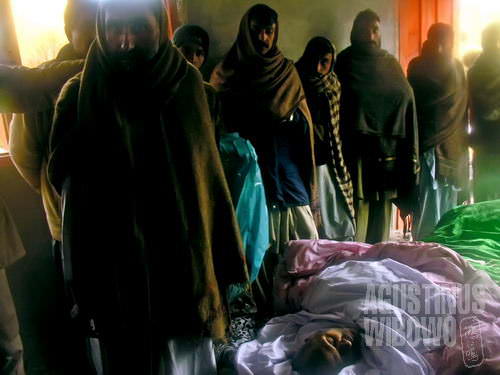
Haji Shahab just passed away few hours earlier
February 25, 2006
Here, 17 kms away from Muzaffarabad, is hilly areas surrounded by snow-peaked mountains. From here, the glorious snowy mountains of Nanga Parbat can be seen in clear days, flying in the blue sky, towering and dominating the atmosphere. Here is the mountain area of Noraseri, where the NGO I am working with has several projects of building permanent shelters for the earthquake victims. And my work is to take documentation pictures of the projects.
But the rain has started since yesterday night, not so big, but continuosly. The weather in the morning was very cold, that everybody in the camp had to halt any works. The rain has made the trekking path in the villages dangerous. And indeed, this is the best weather to just stay lazy and sleep in the tents (not intending to be lazy though… but given chance by the weather ![]() ). Gool Muhammad, the cook, who has experience of working in Greece (Urdu: Yunan, Indonesian: Yunani) was a very excellent cook, and he deserved to boast his ability.
). Gool Muhammad, the cook, who has experience of working in Greece (Urdu: Yunan, Indonesian: Yunani) was a very excellent cook, and he deserved to boast his ability.
I was staying in a tent together with some ‘seniors’ of the team. Aslam Shahab, a Pakistani with Yugoslavian history (travelled overland thru Iraq and Iran up till Pakistan) is an interesting and humorous man. Everybody called him Mao Zedong as somehow he resembles the Chinese man. Another guy in our tent is a Kashmiri, Mr Anis. Very calm, low profile, but also deserve a story.
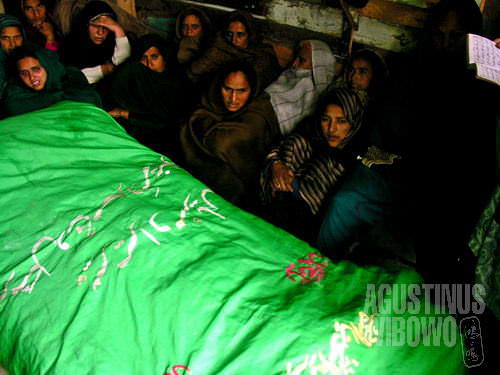
Jenazah ceremony
This is practically my second day here. Still had a lot of things to adapt with, a lot of new people to be acquainted with (was difficult to remember all of their names and personality at once). Electricity problem, no internet (of course), and no mobile signal. I came here unprepared, even didnt bring anything, but my camera. Rashid didnt tell me that the stay might be prolonged so I just departed with my camera and uncharged batteries. And no electricity to recharge. The temperature dropped dramatically because of the rain, and the mood of the day is only: SLEEP.
But the lazy day didnt last long. Mr Anis told me a bad story that a man was died. Man in Urdu is ‘banda’. I thought he was saying about ‘bandar’ (=monkey). A mishappening misunderstanding. He said that all people in the camp are going for the funeral. And he offered me to go. I was in between of lazy and curious, but also afraid that funeral is not a welcoming activity. I bet that Indonesians wouldnt be happy if a stranger attending one’s funeral with curiousity of a tourist. But Rashid said I should go and even I could take any pictures I wished to. We have heard that the funeral would start at 2, but we just departed at 2:15 from our tents. About 15 people were going, not all members of the tent.
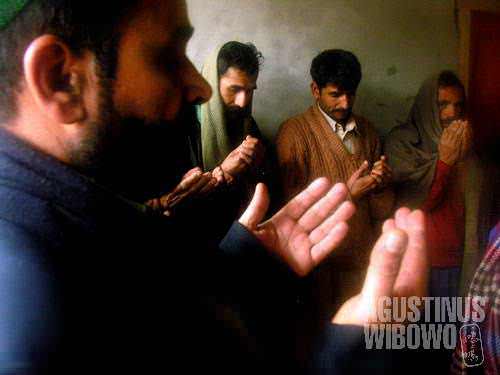
We all pray for his departure
The died man is Hajji Shahab, or Mr Haji, or Pak Haji in Indonesian, someone who has made pilgrimage to Mecca. Anis Shahab said that Hajji Shahab was completely fine a day before, that he visited the camps of our NGO (many surrounding villagers visit the camp everyday to chit and chat with the social workers). The death was too sudden. Heart attack. The house is located down the hill, and the path walking down was very slippery. And my shoes were not made for this track. Luckily Mr Mao Zedong grabbed my hand that my life was saved.
The funeral ceremony itself was completely a new experience for me. The corpse, was placed in the house of the family, surrounded by women who read verses, some were craying next to the corpse. I bet that they were close relatives. But someone told me that many of them are women from the neighbourhood. And why only women? All men were outside the house, and only women who were inside and singing the verses. Parda, or veil, was the answer. Women is under parda, they were stripped off from the men’s world. As men will be responsible to do the burial work, the women has only the chance to read the verses to the death inside the house. Sexual seggregation is a distinctive of Islamic life in Pakistan (compared to moderate Indonesian muslim society).
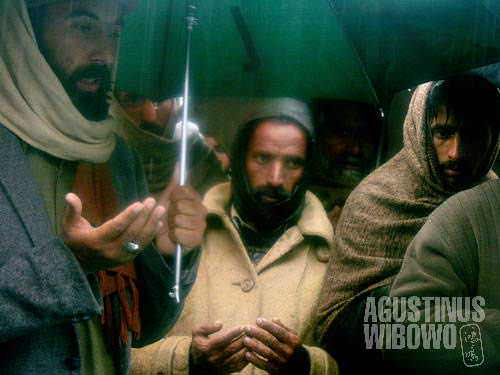
Prayers under umbrellas
After sometime, the corpse was taken out the house by the men. The rain was still there, and all of the accompanians were hiding under umbrellas. The corpse were protected from the rain by plastic layer. Inside the plastic layer, it was green kain with Arabic script and the corpse were wrapped by white ‘kafan’ (the same word in Indonesian and Urdu, but I dont know how to translate into English). The funeral itself in Urdu is called as ‘jenazah’ that includes the activity of taking out the dead body from the house until the burial, but in Indonesian ‘jenazah’ means the corpse.
So the ‘jenazah’ started here. The body were put in the center of a ground, and everybody was standing in lines heading to Macca direction. Nobody stood in front of the corpse. Then the imam started the ceremony. Started by ‘Allahuakbar’, to witness that Allah is only the Greatest. And it was ended by Assalamualaikum warrahmatullah wabarakatuh, a sallam, to the left side and right, was given to the guardians. Some verses were read. I remembered that the prayers for the dead body during the funeral was called as ‘jenazah prayer / salat jenazah’, 2 rakaats only by standing without doing ‘sujud’ correct me if I am wrong. All of the prayers were done under the rain, and only by men, all under umbrellas.
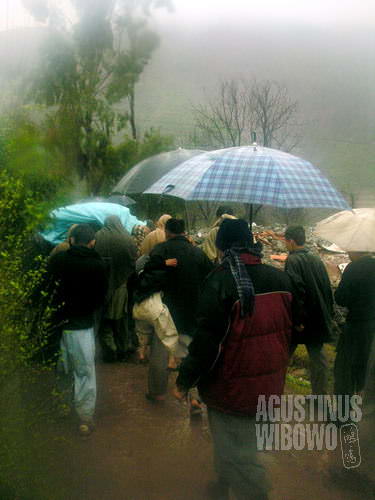
Rain in funeral
I thought that the body was to be buried immediately after that. But I was mistaken. The body was brought to a house, partially demolished by the earthquake, as the building has lost several dozens percent of its faces. In this damaged house, the death body was layed on a bed. Layer by layer, mebrane by membrane, the wrapping fabrics of the corpse was removed from the face. Now it’s the time for the visitors to see the face of the dead for the last time. First chance was only to majority male visitors. As it was not my custom to see the face of the wafat (=died) man directly, I was little bit scared. But the relatives of Haji Shahab even asked me to take close up pictures, which was very strange to me. I was still afraid to capture the close up pictures, but I tried to capture the atmosphere of the moment, the cloudy grey day with rain and water vapour, mournings from the women in the other side of the house, and busy men queuing and looking at the face of the dead man, giving the last respect before the man departing to the other land, khaberistan (Indonesian: alam kubur, English: tomb).
Then it came the chance for the women relatives. The loud cries were heard from the open room. I chose to leave, as I am easily ‘sadness-contaminated’. The chance for women to give the last respect to the dead is not so long, then again they moved to other room, and the corpse was wrapped in kafan again. The funeral was delayed for one more hour, as some of the brothers and daughters have not arrived the area yet. Meanwhile, waiting for the funeral time, some visitors kept coming, and the face was opened each time a visitor come, to show the face of the dead man to the visitor.
The funeral had just started when Haji Shahab’s daughter just arrived from Rawalpindi. This poor woman even didnt get the chance to see his father’s face for the last time. And she cried very loud, supported by some men around her, and it was raining still.
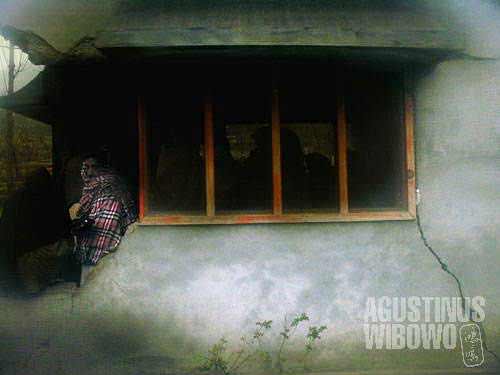
Ceremony is held in a destroyed building
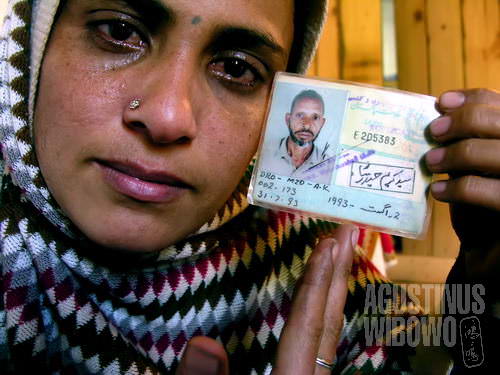
His daughter did not have the opportunity to see him for the last time
The grey day, surrounded by water and vapour, accentuated by the muddy and slippery path, men under umbrellas (surprisingly, some men still can smile and pose in front of my camera), cries of women in an earthquake demolished house, and the slow motion of the death body leaving the human life to the dark life underground…. It was a quick and simple farewell, but left a great impression in my heart.






Leave a comment